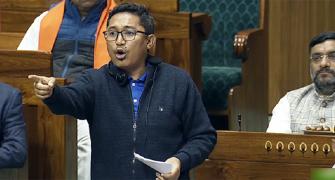Early this year, the Security and Political Risk Analysis India Foundation organised a Roundtable on 'Indo-US Relations under the second Bush administration', at the India International Centre, New Delhi.
Moderated by SAPRA's Executive Director Indranil Banerjie, the panel of speakers included K Subrahmanyam, the doyen of India's strategic affairs thinkers, Ram Narayanan, the well-known Indian-American activist, his wife Loral Alberta Narayanan, the main actor behind a web site devoted to India-US relations (www.usindiafriendship.net); Geoffrey R Pyatt, minister councillor for political affairs, embassy of the United States of America in New Delhi; G Parthasarathy, former Indian ambassador to Pakistan; and Jaideep Saikia, an expert on terrorism.
In his address, Ram Narayanan explained why India and the US are natural allies, and what this means for the world at large, particularly China. Here is what he had to say.
My brief is what the next four years portend for the US-India relationship -- but let us, for a moment, step back and view the question through a wider angle, a larger lens.
Let us look at what the next twenty years -- or thirty, or forty -- hold for these two nations.
In that larger span of time, the most likely geo-strategic scenario is the emergence of seven global power centers -- China, the United States, India, the European Community, Russia, Japan and Brazil.
China, for very good reasons, is at this present moment the observed of all observers; the one nation that attracts all attention. The reasons are obvious -- it is almost a given that China will forge ahead of the United States in terms of GDP. It is also a very real possibility that China will emerge as the number one superpower in every significant respect. Economically, militarily, even in the realm of technology, it is poised to overtake the US.
US wooing India to check China: minister
So what does that imply?
A future war pitting the current superpower against the wannabe? I think not -- wars between the major powers are simply unthinkable in a future scenario.
The concept of world wars, I submit, is obsolete -- because there is too much at stake in terms of inter-country involvement in investment, economics and trade, and people-to-people movement and cooperation.
However, the leading nations will continue to feel the pressure to achieve and maintain economic, military and technological dominance -- and that is precisely where the United States will be at a disadvantage vis-a-vis China.
All demographic indicators are in favor of China -- population size, age-structure of the population, the sheer size of the working population, and the numbers of trained scientists and technologists produced every year.
Every single indicator relevant to this analysis favors China, and works against the United States.
US, China, India: A tri-polar world?
Of the seven superpowers of the 21st century I named at the outset, China is the only aggressive competitor of the United States -- and more, it is determined to win that competition, come what may!
So, the corollary -- is the US doomed to play second fiddle to China? My answer is, no.
To qualify that -- not if existing levels of US-India cooperation extend intensively into the coming decades.
India's importance lies in the fact that it brings to the partnership table exactly the attributes the US lacks, and desperately needs, in this competition with China.
Look at the list: India's demographics are even more favorable than China's.
For starters -- as then Prime Minister Atal Bihari Vajpayee pointed out in his August 15, 2003 address from the Red Fort, India boasts over 600 million people in the working age group.
This working force will overtake China's by 2025, and decisively so by 2050.
Perhaps even more significantly, India edges China handily when it comes to intellectual capital. Its ability to produce first rate scientific, technological and managerial manpower equals, even exceeds, that of China, with the added plus of being able to 'think' in English!
Skills war? 'India, China will beat US'
To sum up -- India has exactly what the US lacks.
And most importantly, from the US point of view, India can never be, will never be, an aggressive competitor the way China is.
China has, for well over a decade now, bent its collective will to one single strategic objective, which it chases with trademark ruthlessness -- namely, to dethrone the US from its current position as the world's sole acknowledged economic, technological and military superpower.
One fact is obvious -- given the demographic disadvantage the US suffers, it can never win this competition; not if it tries to fly solo.
From that fact, emerges another -- the only way the US can in fact win, is by teaming up with India. It has no other option.
A US-India partnership, by whatever name it's called, is a winner; it is, in fact, the only possible partnership with the ability to offset the surge in China's geo-political and economic powers.
In a sense, mine is not an original thought -- a potential US-India alliance against China has been mooted before, by some scholars.
But -- and this is a very, very important but -- most such scholars have, I submit, gotten hold of the wrong end of the stick. When they talk of such an alliance, it is normally couched in terms of military strategy; the general thesis invariably is that India will form a buffer between the US and China's emerging military might.
That thinking is wrong -- absolutely wrong!
Let me repeat -- there is no logical possibility of war between India and China, or the US and China.
Or, more accurately, there is no possibility of military engagement. War there is, and war there will be -- but it is, and will be, a war fought on the battlefields of the economy, and of technology. And it is here that the US and India stand out as natural, logical -- even inevitable -- partners. Standing alone, each nation has its own limitations -- but together, they quite simply can not be beaten.
Let us get one other fact clear a US-India partnership of the kind I outline will not be directed against China - or, in fact, any other country or group. It is only the naïve who will talk in terms of the US and India forming an anti-China alliance.
Why?
Simple! For both nations, there is too much to lose. The United States has very substantial interests in China. The volume of US-China trade, and of US investments is enormous and growing more so with each passing year. Simultaneously, the magnitude of Chinese support in financing US deficits completely rules out any inimical posture on the part of the US.
Likewise, India-China trade is on an upward trajectory, and poised to grow further. In other words, it is in the economic self-interest of both these countries to refrain from inimical moves.
So, if a US-India partnership is not against China, then what is it for?
Simple: Self interest, self-preservation no doubt. But, more importantly, the partnership will seek to advance joint interests in value in a stable, democratic and prosperous world free from terrorism and the threats of weapons of mass destruction, drug and human trafficking.
Such a partnership will, put simply, enable both the US and India to move forward in calibrated fashion, leveraging each others' complementarities in resource endowments and carrying them to their logical end.
Such a partnership will entail very clear communication with China on the part of both nations. The US will need to make it clear that there will be no change in its policy of engagement with China. India will need, when necessary, to restate its policy of promoting closer economic and trade ties with China. And both countries will, in fact, continue to strengthen the China side of their respective relationships.
That said, the logical end of a US-India partnership would be to systematically leverage their respective comparative advantages this strategy will, over a period, help maintain a balance of power in the world.
It will add substantially to the economic and technological prowess of both the US and India -- something they will not achieve if they do not work together.
Let me add here that this partnership that I envisage will, for the most part, take the form of industry-to-industry, and people-to-people, cooperation with the full backing of their political leadership.
Also, India will be a very important source of immigration and labor for the US. India already is the second highest source of legal immigration into the US after Mexico.
NRIs catalyst in US-India ties
So on to the inescapable question -- will the two countries actually move towards such a partnership, given that it needs strong commitment and vision?
Again, I think the answer is yes -- unless, of course, the US does not mind surrendering its current position in world affairs to China. In other words, for this marriage of commitment to happen, it is entirely up to the United States to say 'yes', to wear the ring on its finger.
So assume, for the moment, that the US does say yes -- if only because a 'no' is too illogical to contemplate. This, then, brings me to my original theme -- what is the prognosis for the next four years?
What needs to happen, over the next four years of the Bush administration, in terms of policy action?
First: Both sides, but especially the United States, must acquire, to use Under Secretary of Defense Douglas Feith's words, 'a deeply rooted appreciation of common strategic interests.'
Both sides must understand that such interests embrace security and defense needs -- but goes way, way beyond that, to take in the entire gamut of the relationship.
Second, both sides -- and here again, especially the United States -- must make a determined bid to get rid of the remaining cobwebs of the Cold War era. In this connection, here is a question that merits thought: Has the unprecedented post-tsunami US-India naval cooperation, though for a short duration, designed to mount one of the biggest relief efforts in history, opened up a window to overcome what Professor Raja Mohan calls 'entrenched mindsets in their establishments'?
Third, the US will have to get around NPT, NSG and other alphabet-soup obstacles to full fledged technological cooperation with India.
US using India to carry out its designs: CPI-M
Fourth, both nations will need to manage, imaginatively and effectively, their differences in regard to Pakistan which, in terms of the larger picture presented here, should be nothing more than a minor irritant.
Fifth, a massive flow of American investment is required, especially into India's infrastructure, for which India must prepare the ground. The latter point is the key.
US companies will go where they find the greatest and easiest opportunities to make money.
Sixth, India provides opportunities for enhancement of US competitiveness through outsourcing and expansion of market. It is in the vital interest of the US to have India's market expand, and for India to become an alternative to China as a manufacturing hub.
Overriding all this -- as an absolutely essential precondition -- is the establishment of a climate of total trust between the leaders of the US and India, at all levels -- a trust that binds the top political leadership, the bureaucracy at senior, middle and junior levels and, of course, the R&D establishments in both nations.
It has to be a trust that can survive the minor irritants that will crop up in the bilateral relations; a deeper understanding of each other's realpolitik. A trust, say, that can successfully wade through a seeming US closeness to Pakistan, or an apparent Indian nexus with Russia or Iran.
Given such a climate of trust, the present hesitant steps on the multi-faceted fronts that define the US-India relationship will see a jump-start, and a smooth ride to reach heights never before attained by any two nations on earth.
Next: The US needs India!








